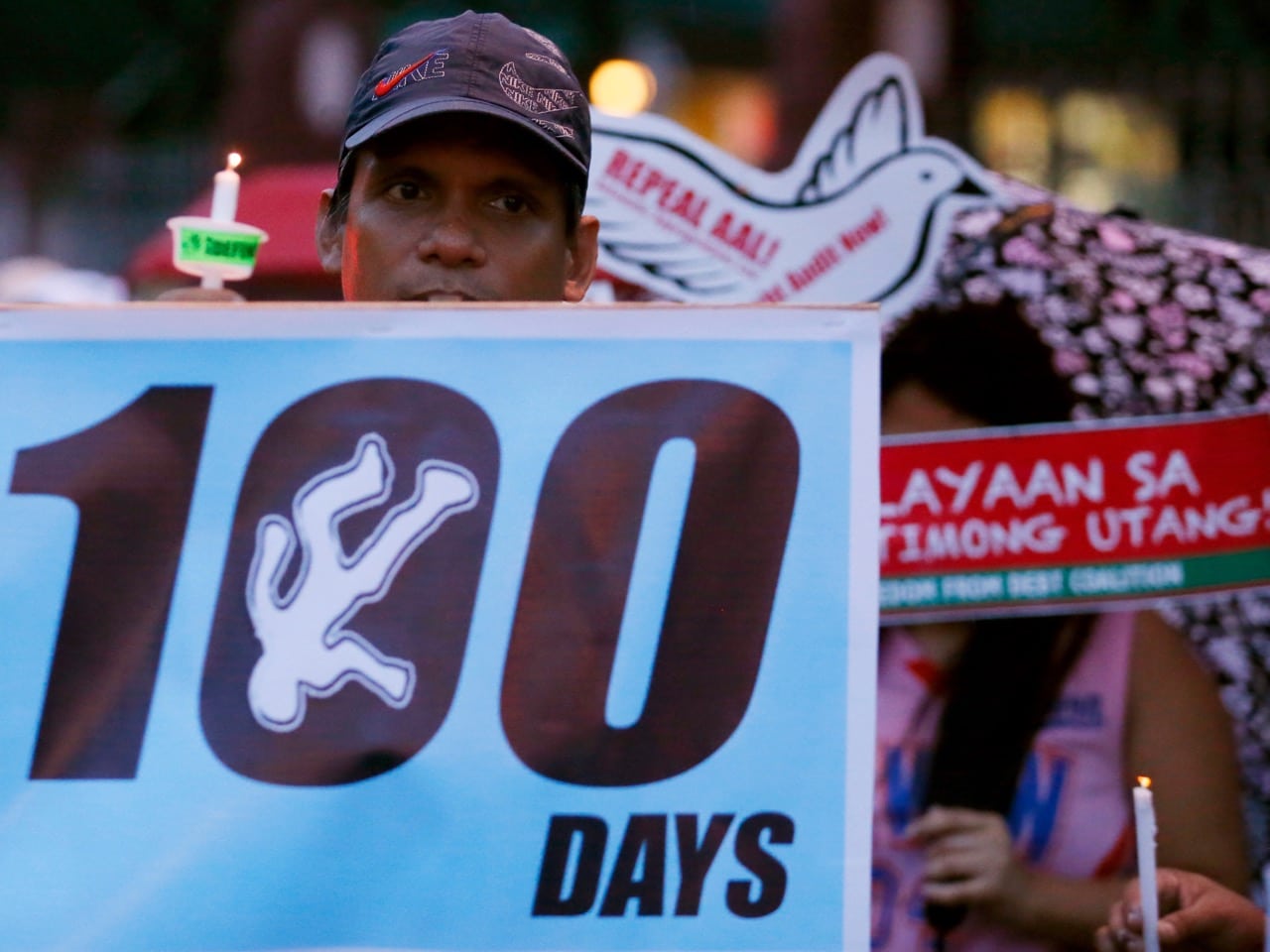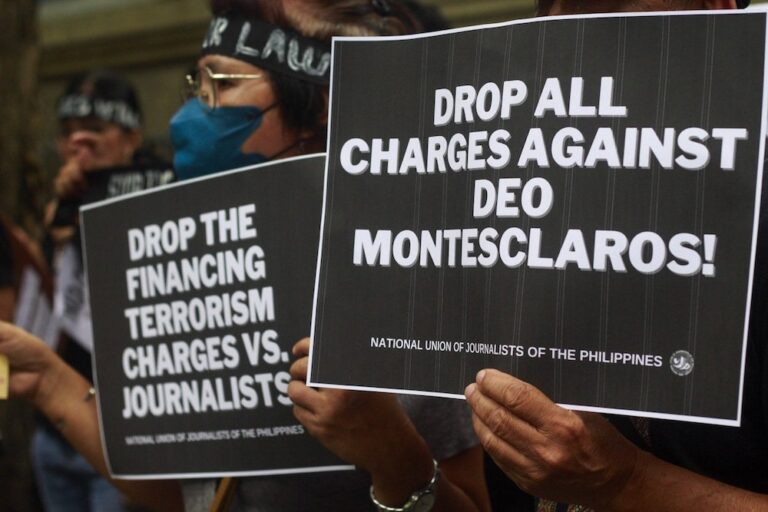Monitoring the peculiar coverage of President Duterte by a number of Filipino TV news programmes.
This statement was originally published on cmfr-phil.org on 24 October 2016.
President Duterte is waging an unforgiving war against drugs that has so far claimed over 3,000 lives. He has disparaged human rights as a shield to protect criminals. He has expressed anger and directed expletives at global leaders, foreign governments and the United Nations (UN), including US President Barack Obama, UN Secretary General Ban Ki-Moon and the European Union for supposedly interfering in his policy against illegal drugs. He has also made a policy decision to end joint military training exercises with the US, threatening to break away from the country’s traditional and longest-standing ally.
These were on top of the mind as the media and government communications team reviewed the one hundred days of the Duterte administration. But the questions arising from these developments did not get much time in the news programs of the day or in the TV specials prepared for this dubious milestone. One hundred days is after all only a propaganda measure for governments wanting to look good. But TV seemed glad enough to play a part in the government’s PR game.
It is not that there were no good things to celebrate: The policy to look for solutions to cut down the queues inflicted on the public seeking service from various agencies. The extension of the validity of drivers’ licenses to five years, and of passports to ten years.The roll out of an expansive and ambitious infrastructure plan.
But in a hundred days these were only announced intentions and the media should have been wary about promoting these as done deeds. Even the rather simple item of cutting down the time for the renewal of licenses and can be bogged down by all kinds of problems, the delay in the procurement of supplies, the shortage or slowness of personnel in bureaucracies.
Making things work takes time, and only so much can be accomplished in a hundred days. The media then should also examine issues of grave concern.
CMFR monitored the media’s coverage specifically in the news programs 24 Oras (GMA-7), Aksyon (TV5), Network News (CNN Philippines) and TV Patrol (ABS-CBN 2), as well as relevant special reports “D-Day Plus 100” (TV5), “Town Hall: The First 100 Days” (CNN Philippines), and “PDU30@100” (GMA-7) on the topic from Oct. 3-9, 2016.
The TV news specials each had their own different approach on covering the topic. TV5 had a three-part series, which ran for 20 minutes each, in which three resource persons were interviewed regarding a specific topic. CNN Philippines’ had a town hall format, while GMA-7 had a feature-length special report.
CMFR noted 19 news reports from the four primetime news programs which looked into the 100 days of Duterte. Government personalities, as well as academics, experts and analysts were the most sought after resource persons in the daily news reports. (See Figure 1, Figure 2)
The 100 days of Duterte segments in the four primetime news programs allotted most of its airtime to academics, experts and analysts (7 minutes and 46 seconds) closely followed by government officials (6 minutes and 9 seconds). (See Figure 3)
Despite the amount of time given to them, some of the academics and experts expressed conditional optimism about moving forward with policy initiatives as dependent on the implementation of the announced programs. If non-government sources said anything about issues, specifically human rights, these were not included in the final cuts.
In the TV specials, much airtime was dedicated to government sources (57 minutes and 39 seconds) as these highlighted the administration’s war on drugs. But a great portion of it was from Philippine National Police (PNP) Director General Ronald “Bato” Dela Rosa’s guesting in CNN Philippines’ town hall special (50 minutes).
Human costs overlooked
Noticeably lacking was any discussion of the human rights issues that have haunted the administration’s war on drugs – despite reports citing PNP data on the total number of casualties since May, after Duterte won the presidency in the last elections. Some reports noted this but did not go into detail.
A TV Patrol report tried to look into the human rights aspect of Duterte’s anti-illegal drugs war. The report featured Ellecer Carlos, spokesperson of human rights group In Defense of Human Rights and Dignity Movement (iDefend), who offered a contrary opinion and called for a stop to the killings. (“Giyera kontra droga ng administrasyong Duterte,” TV Patrol, Oct. 3, 2016)
24 Oras had a similar attempt in its Oct. 7 report, with policy analyst and Ateneo School of Government Dean Ronald Mendoza noting the pros and cons of the Duterte administration, so far. The report, however, did not show Mendoza discussing the human rights implications of the anti-drug related deaths. (“Pangako ni Pres. Duterte: Wawakasan ang droga at kriminalidad”)
No media issues
As early as May, the media had been having difficulties covering the tough-talking Duterte, and have been at the receiving end of the rants of Duterte supporters apparently emboldened by the president’s own verbal attacks on the press for its supposedly critical reports on the administration. Media personalities vocal about their views on certain issues have been mobbed online, and assailed with claims of bias and corruption. But media issues received scant attention even from the press itself.
No reports on the rocky relationship between the media and the administration addressed the issue in any of the primetime news programs, although some effort to discuss the matter was apparent in the television specials.
TV5’s ReAksyon touched on this subject in the second part of its “D-Day Plus 100” special. ReAksyon discussed with TV5 news anchor Ed Lingao the trends and changes on social media in the context of freedom of expression. The episode, which aired on Oct. 6, explored the issues of cyber-bullying, online threats, intolerance for contrary opinion, claims of bias and paid-for journalism, and the term “presstitutes” – things which Lingao noted as factors that now affect the process of news writing.
Lingao, who himself was at the receiving end of backlash and online threats, raised the importance of a free and independent press, and of critical reportage of policies and issues regardless of who is in power.
GMA-7’s “PDU30@100” had a chance to discuss media issues, but missed it. The special had a segment which featured GMA reporters talking about their experience in covering Duterte. Instead, the segment devoted time to “humanizing” the president, showing clips of how he behaves at home and towards his family. And yet the reporters’ recollections could have been an opportunity to look into Duterte’s flip-flopping attitude towards the media in general and its corresponding adverse effects on a free press, specifically.
Missed opportunity
The media had been relentless in covering nearly everything about Duterte – not only his expletives, or his outrageous claims and outbursts, but also such praiseworthy initiatives as his resumption of peace talks with various armed social movements. Despite unprecedented challenges in covering the Duterte administration, the media had remained steadfast in their attempts to deliver timely and relevant information to the public. But the critical stance was not as evident in the media’s evaluation of Duterte’s first 100 days. Given the controversies hounding the first hundred days, television could have given more time to the issues of concern to remind the public about the problems confronting any administration.
Post-Script
Business World, a media partner of Social Weather Station (SWS), released the results of the first post-election survey on Oct. 7, the 100th day. The rest of the media could not have reviewed the results until later.
Analysis of the findings show that while Duterte had a net approval of 68 percent, 94 percent of the respondents in effect expressed their disapproval of the drug-related killings by saying that it was important to keep suspects allegedly involved in the illegal drug trade alive.
Also later, former President Fidel Ramos took issue with Duterte’s leadership style, his tendency not to be consultative, his “off and on” statements on Philippine-US relations, and his free use of expletives. Ramos went to the extent of saying that Duterte must “prove his mental stability” and “psychological fortitude” so he can lead the country to “the promised land” of peace and prosperity.
The media must sustain public attention on Duterte’s policies and how these actually affect the people. The first hundred days of the Duterte administration could be an indicator of how the presidency will perform for the next six years. If news organizations engage in this exercise, they should readily point to the “red flags” as these signal potential trouble that can be avoided.
Newspapers stepping up
The levels of public approval of the Duterte administration remain high, and strong public support apparently colored the coverage. Many are happy and satisfied with the performance of President Duterte. But the media as an institution and a community are useful only to the extent that it is true to its function to hold the performance of public officials to close examination.
During the first 100 days, the newspapers published editorials and opinion pieces, along with some special features, which noted critically the president’s stance on human rights and the authoritarian tendency to form or change policy by fiat. His focus on the drug war seemed obsessive, as though this were the only problem that truly deserved his attention. These concerns should have received more play on television, with its greater impact on the public as a source of political news.
Its less critical treatment of the issues that concern a significant if minority segment of the population is deeply disturbing. It is at this time, when both a rubber stamp Congress and a supportive and unquestioning public exist, that journalists must sharpen their skills to discharge the critical function of watchdog of power.
“Too late” can come too soon.



